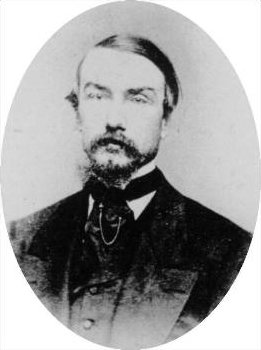Collett Leventhorpe facts for kids
Quick facts for kids
Collett Leventhorpe
|
|
|---|---|
 |
|
| Born | May 1, 1815 Exmouth, Devon, England |
| Died | December 1, 1889 (aged 74) Wilkes County, North Carolina |
| Place of burial | |
| Allegiance | |
| Service/ |
14th Regiment of Foot |
| Years of service | 1832– 1842 (UK) 1861–1865 (CSA) |
| Rank | Captain (UK) Brigadier General (CSA) |
| Battles/wars | American Civil War |
Collett Leventhorpe (May 15, 1815 – December 1, 1889) was an important soldier. He became a brigadier general in the Confederate States Army during the American Civil War.
Contents
Early Life and Military Start
Collett Leventhorpe was born in Exmouth, England, on May 15, 1815. His father passed away when Collett was very young. Collett's family had a long history, even connected to royalty! His older brother, Thomas Leventhorpe, was a famous cricket player for Cambridge University.
Collett went to Winchester College until he was 14. After that, he had a private teacher for three years.
In 1832, Collett joined the British Army. He bought the rank of ensign in the 14th Regiment of Foot. He spent three years serving in Ireland. On November 2, 1835, he bought the rank of lieutenant. He then served in the British West Indies for several years, followed by a year in Canada. By November 16, 1842, Leventhorpe became a Captain. He later left the British Army to travel to South Carolina for business.
Life Before the War
In 1843, Collett Leventhorpe visited the United States. He traveled to Asheville, North Carolina. There, he met Louisa Bryan, who would become his wife. Louisa was the daughter of General Edmund Bryan.
Leventhorpe then studied at the Medical College of Charleston in Charleston, South Carolina. He was a top student in his class. On April 1, 1849, he married Louisa. They made their home in Rutherfordton, North Carolina. Even though he studied medicine, Leventhorpe never worked as a doctor. In 1849, he became a citizen of the United States.
Serving in the Civil War
When North Carolina decided to leave the United States, Collett Leventhorpe offered his military skills. Because of his background, he became a colonel in the 34th North Carolina Infantry. He spent the first months of the war training his soldiers.
In December 1861, he was given temporary command of a larger group of soldiers called a brigade. He helped guard the Roanoke River and the Weldon Railroad Bridge. In April 1862, he took command of the 11th North Carolina regiment. He was sent to protect the coast near Wilmington. Later that year, he defended areas along Virginia's Blackwater River.
Key Battles and Injuries
In December, Leventhorpe returned to North Carolina. He led his troops well at the Battle of White Hall. This battle helped slow down Union forces moving toward Goldsboro, North Carolina.
In April 1863, Leventhorpe's 11th North Carolina joined General Robert E. Lee's army. They fought in the famous Battle of Gettysburg. On July 1, Leventhorpe was badly hurt during a fight. He was shot in his left arm and hip. He was captured by Union soldiers during the retreat.
A Union doctor wanted to remove his arm because of a serious infection. Leventhorpe refused. Instead, the doctor treated the wound with a strong chemical. Leventhorpe bravely refused pain medicine, saying he would rather suffer than show weakness to an enemy. His arm slowly healed, but pieces of bone came out for three months.
Prisoner and Later Service
Leventhorpe was held as a prisoner at Fort McHenry and Point Lookout for eight months. Friends in England sent him money for supplies. After he was released, he left his command of the 11th North Carolina. He then led a group of North Carolina Home Guard soldiers who tracked down soldiers who had left the army.
He was later made a brigadier general for the state troops. He defended the Roanoke River and the Petersburg & Weldon Railroad. He was the only English-born soldier to reach this rank in the Confederacy. In February 1865, he was offered the rank of brigadier general in the Confederate Army, but he chose to stay in state service. His troops defended Raleigh when Union General William T. Sherman marched through North Carolina. Leventhorpe and his men surrendered on April 26, 1865.
After the War
After the war, Collett Leventhorpe worked in several businesses and was involved in politics. He and his wife lived in New York City for a time and often traveled to England. He eventually settled in Wilkes County, North Carolina. He passed away there on December 1, 1889.
 | Delilah Pierce |
 | Gordon Parks |
 | Augusta Savage |
 | Charles Ethan Porter |

